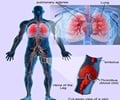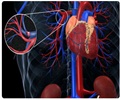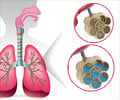Wyss Institute researchers at Harvard have managed to recreate pulmonary edema in microchips that are built using living cells.
Wyss Institute researchers at Harvard have managed to recreate pulmonary edema in microchips that are built using living cells and can mimic the functioning of organs, in this case the lungs, leading to hopes that the chips can be used to lower the costs associated with drug development.
The researchers had earlier developed the lung-on-a-chip model back in 2010 by making use of a flexible polymer material filled with hollow channels. The device is a size of a memory stick and each channel is made up of a permeable membrane lined with human lung cells on one side and tiny blood vessel cells on the other.
Experts hope that further development of the chips may lead to their use in research, which will not only reduce the dependency on animal trials, but also avoid high costs of drug development by identifying potential health problems associated with the drug even before clinical trials.
Source-Medindia












